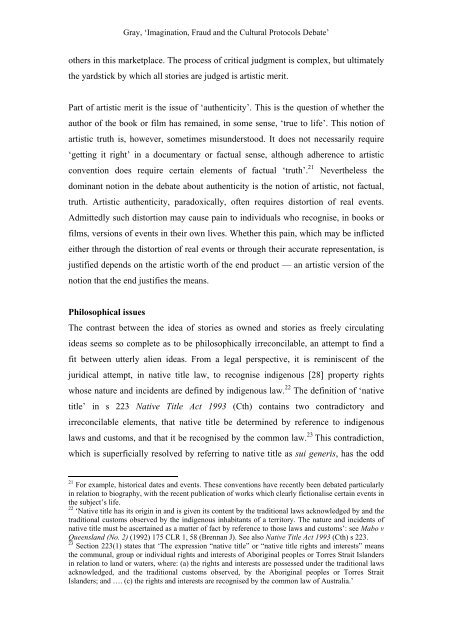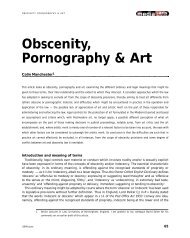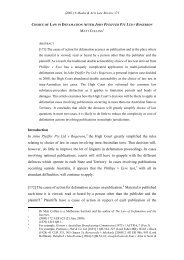Recent controversy over Phillip Gwynne's book Deadly, Unna? and ...
Recent controversy over Phillip Gwynne's book Deadly, Unna? and ...
Recent controversy over Phillip Gwynne's book Deadly, Unna? and ...
You also want an ePaper? Increase the reach of your titles
YUMPU automatically turns print PDFs into web optimized ePapers that Google loves.
Gray, ‘Imagination, Fraud <strong>and</strong> the Cultural Protocols Debate’<br />
others in this marketplace. The process of critical judgment is complex, but ultimately<br />
the yardstick by which all stories are judged is artistic merit.<br />
Part of artistic merit is the issue of ‘authenticity’. This is the question of whether the<br />
author of the <strong>book</strong> or film has remained, in some sense, ‘true to life’. This notion of<br />
artistic truth is, however, sometimes misunderstood. It does not necessarily require<br />
‘getting it right’ in a documentary or factual sense, although adherence to artistic<br />
convention does require certain elements of factual ‘truth’. 21 Nevertheless the<br />
dominant notion in the debate about authenticity is the notion of artistic, not factual,<br />
truth. Artistic authenticity, paradoxically, often requires distortion of real events.<br />
Admittedly such distortion may cause pain to individuals who recognise, in <strong>book</strong>s or<br />
films, versions of events in their own lives. Whether this pain, which may be inflicted<br />
either through the distortion of real events or through their accurate representation, is<br />
justified depends on the artistic worth of the end product — an artistic version of the<br />
notion that the end justifies the means.<br />
Philosophical issues<br />
The contrast between the idea of stories as owned <strong>and</strong> stories as freely circulating<br />
ideas seems so complete as to be philosophically irreconcilable, an attempt to find a<br />
fit between utterly alien ideas. From a legal perspective, it is reminiscent of the<br />
juridical attempt, in native title law, to recognise indigenous [28] property rights<br />
whose nature <strong>and</strong> incidents are defined by indigenous law. 22 The definition of ‘native<br />
title’ in s 223 Native Title Act 1993 (Cth) contains two contradictory <strong>and</strong><br />
irreconcilable elements, that native title be determined by reference to indigenous<br />
laws <strong>and</strong> customs, <strong>and</strong> that it be recognised by the common law. 23 This contradiction,<br />
which is superficially resolved by referring to native title as sui generis, has the odd<br />
21 For example, historical dates <strong>and</strong> events. These conventions have recently been debated particularly<br />
in relation to biography, with the recent publication of works which clearly fictionalise certain events in<br />
the subject’s life.<br />
22 ‘Native title has its origin in <strong>and</strong> is given its content by the traditional laws acknowledged by <strong>and</strong> the<br />
traditional customs observed by the indigenous inhabitants of a territory. The nature <strong>and</strong> incidents of<br />
native title must be ascertained as a matter of fact by reference to those laws <strong>and</strong> customs’: see Mabo v<br />
Queensl<strong>and</strong> (No. 2) (1992) 175 CLR 1, 58 (Brennan J). See also Native Title Act 1993 (Cth) s 223.<br />
23 Section 223(1) states that ‘The expression “native title” or “native title rights <strong>and</strong> interests” means<br />
the communal, group or individual rights <strong>and</strong> interests of Aboriginal peoples or Torres Strait Isl<strong>and</strong>ers<br />
in relation to l<strong>and</strong> or waters, where: (a) the rights <strong>and</strong> interests are possessed under the traditional laws<br />
acknowledged, <strong>and</strong> the traditional customs observed, by the Aboriginal peoples or Torres Strait<br />
Isl<strong>and</strong>ers; <strong>and</strong> …. (c) the rights <strong>and</strong> interests are recognised by the common law of Australia.’



![ERIN O'DWYER [92] Introduction Striking a balance between ...](https://img.yumpu.com/14667367/1/184x260/erin-odwyer-92-introduction-striking-a-balance-between-.jpg?quality=85)


